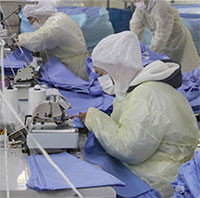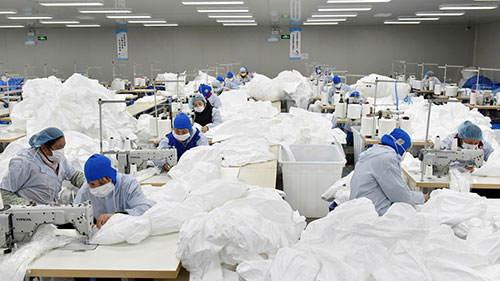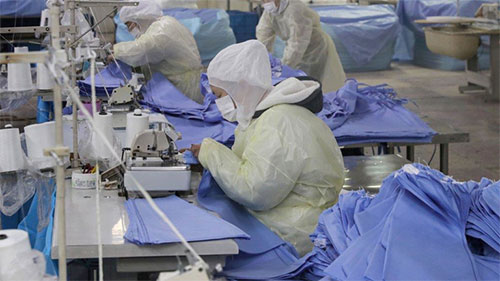"The impact of Coronavirus can be felt across the globe. The apparel and textile industry across the world is facing numerous challenges from sourcing to retail. And this uncertainty is affecting business"
 While the US-China trade war has negatively affected Chinese textile and apparel industry, the latest Coronavirus threat is sparking even more uncertainty in supply chains. The unpredictability surrounding the extent to which this virus is likely to spread, coupled with government-mandated production delays in select provinces and cities, is leading to an uncertainty over how it is likely to impact global manufacturing across sectors. It is likely to put export growth on hold, prolonging uncertainty regarding how motivating the phase one may be for US cotton exports.
While the US-China trade war has negatively affected Chinese textile and apparel industry, the latest Coronavirus threat is sparking even more uncertainty in supply chains. The unpredictability surrounding the extent to which this virus is likely to spread, coupled with government-mandated production delays in select provinces and cities, is leading to an uncertainty over how it is likely to impact global manufacturing across sectors. It is likely to put export growth on hold, prolonging uncertainty regarding how motivating the phase one may be for US cotton exports.
Demand for textile fibers to fall
As data from the firm Wood Mackenzie reveals, one impact of the virus outbreak is likely to be the weakening demand for textile fibers like polyester as business activities may stall. Due to weak demand, producers, spinners and weavers are likely to return to their hometowns, which could lead to further faltering of the polyester chain. Besides polyester, other related industries like paraxylene industry are also likely to suffer.
Global cotton consumption is likely to dip by least 500,000 bales, thus increasing world carryover and reducing US exports. This could increase US cotton inventory by over a million bales over the past year to 5.9-6.0 million bales. Following prolonged decline in the US cotton exports, China recently made its strongest purchases of cotton in nearly two years. The country has been a key engine of economic growth for the past several decades.
Brands closing stores to prevent losses
Besides textile players, many brands and fashion houses in China are also reeling under the impact of coronavirus on their businesses. Some brands that have shut stores are: Nike, Adidas,and Capri Holdings, which owns Versace, Jimmy Choo and Michael Kors. These brands have warned investors of sales taking a hit if the virus continues to spread across China. To prevent this from happening, Capri has closed around 150 of its stores in mainland China while Nike has down shutters on about half of the stores. Adidas too has shut a significant number of shops alongwith Ralph Lauren Corp and Tiffany & Co.
As a result of this epidemic, Levi Strauss & Co, which has shut about half of its stores in China due to Coronavirus, has taken a near-term financial hit. The virus outbreak is also impacting the assessment of world’s leading luxury groups. For instance, LVMH and Kering have lost their shares by around 5 per cent and 6 per cent. The epidemic has also put expenditures worth $149 billion at risk. As global newswires have revealed, Chinese stock markets have plunged by around 8 per cent since the outbreak of the virus.
Fashion events, fairs across the world being deferred
As the epidemic intensifies, the National Chamber of Italian Fashion has declared its solidarity with China. At the Milan Fashion Week, the chamber will introduce a twofold campaign, with a special event and multiple video conferences. In its 2020/21 season, it will organise 56 runways dedicated to ready-to-wear for fall-winter. The opening of the fashion week will take place on February 18, with the Chinese solidarity campaign. The opening of the Fashion Hub Market, a space dedicated to emerging creators, will serve as the backdrop for the event. Some Chinese designers based in Italy and Europe who typically show at Milan Fashion Week, will not participate this time around due to late shipments from China.
Meanwhile American Events suspended the NE Materials Show, scheduled for February 5 and 6 in Boston, as well as the NW Materials Show, scheduled for February 12 and 13 in Portland, OR. Organisers from Hong Kong-based Asia Pacific Leather Fair said they were considering postponing their event, set for the end of March. Major technology shows in Bangladesh, namely Dhaka International & Garment Machinery (DTG), has also been postponed.
The Première Vision Sports Show, Portland will be held as planned on February 12 and 13 but will not host attendees and partners from China.
Sourcing delays
With long business closures and manufacturers in Hubei – the epicentre of the virus –closed until February 13. Many companies have informed their stakeholders about the delay in deliveries, while some are planning to shift their orders. As the disease continues to spread, there are concerns about sourcing from China. While factories in China are scheduled to reopen, numerous big cities in the country have been locked down, making it impossible for workers to return to their job. Further, it is hard to predict how long such an unprecedented large-scale lockdown will last.
Global fashion companies are at the moment following a ‘wait and watch’ policy. However, some delays in orders are unavoidable. At the same time, shifting orders to other countries is not a quick solution at this point either because, China remains the single largest textile and apparel supplier with no alternatives; other apparel exporting countries (especially those in Asia) rely heavily on textile raw material, such as yarns and fabrics from China; in many apparel factories in Asia and Africa, the management team is from China. And, many countries around the world have imposed travel restrictions on Chinese travelers at the moment. Indeed, the present situation could push more companies to look for new sourcing destinations. Moreover, for global fashion brands and retailers sourcing cost could rise as it requires more resources to move products around and build new supply chains












